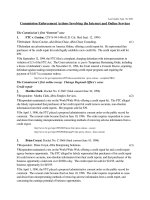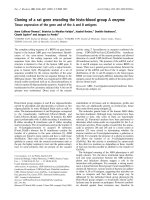Discrimination at Work The Psychological and Organizational Bases pot
Bạn đang xem bản rút gọn của tài liệu. Xem và tải ngay bản đầy đủ của tài liệu tại đây (34.08 MB, 537 trang )
Discrimination
at
Work
The
Psychological
and
Organizational
Bases
This page intentionally left blank
Discrimination
at
Work
The
Psychological
and
Organizational Bases
Edited
by
Robert
L.
Dipboye
University
of
Central Florida
Adrienne Colella
Texas
A&M
University
LAWRENCE ERLBAUM ASSOCIATES, PUBLISHERS
2005
Mahwah,
New
Jersey London
Senior Acquisitions Editor: Anne
Duffy
Editorial Assistant: Kristin Duch
Cover
Design:
Kathryn
Houghtaling
Lacey
Textbook Production Manager: Paul Smolenski
Full-Service Compositor: TechBooks
Text
and
Cover Printer: Sheridan Books, Inc.
This book
was
typeset
in
10/12
pt.
Palatino Roman, Bold,
and
Italic.
The
heads were typeset
in
Poppl Laudatio, Poppl Laudatio Bold,
and
Poppl Laudatio Bold
Italic.
Copyright
©
2005
by
Lawrence Erlbaum
Associates,
Inc.
All
rights
reserved.
No
part
of
this book
may be
reproduced
in
any
form,
by
photostat, microform, retrieval system,
or any
other means, without prior written permission
of the
publisher.
Lawrence Erlbaum Associates, Inc., Publishers
10
Industrial Avenue
Mahwah,
New
Jersey 07430
www.erlbaum.com
Library
of
Congress
Cataloging-in-Publication
Data
Discrimination
at
work
: the
psychological
and
organizational
bases
/
edited
by
Robert
L.
Dipboye, Adrienne Colella.
p.
cm.—(The Organizational Frontiers Series)
Includes bibliographical references
and
indexes.
ISBN
0-8058-5207-7
(cloth
:
alk. paper)
1.
Discrimination
in
employment—Research.
2.
Industrial organization—Social
aspects—Research.
3.
Prejudices—Research.
4.
Stereotype (Psychology)—Research.
5.
Diversity
in the
workplace—Management—Research.
6.
Discrimination
in
employment—Prevention—Research.
I.
Dipboye, Robert
L. II.
Colella, Adrienne,
1961-III.
Series.
HD4903.D573
2005
331.13'3—dc22
2004016293
Books published
by
Lawrence Erlbaum Associates
are
printed
on
acid-free
paper,
and
their bindings
are
chosen
for
strength
and
durability.
Printed
in the
United States
of
America
1 0
98765432 1
The
Organizational
Frontiers
Series
The
Organizational Frontiers Series
is
sponsored
by The
Society
for In-
dustrial
and
Organizational Psychology
(SIOP).
Launched
in
1983
to
make
scientific
contributions
to the
field,
the
series
has
attempted
to
publish
books
on
cutting edge
theory
research,
and
theory-driven practice
in
industrial/organizational psychology
and
related organizational science
disciplines.
Our
overall
objective
is to
inform
and to
stimulate research
for
SIOP
members (students, practitioners,
and
researchers)
and
people
in
related
disciplines including
the
other subdisciplines
of
psychology, organiza-
tional
behavior, human resource management,
and
labor
and
industrial
relations.
The
volumes
in the
Organizational Frontiers Series have
the
fol-
lowing goals:
1)
Focus
on
research
and
theory
in
organizational science,
and the
impli-
cations
for
practice.
2)
Inform
readers
of
significant
advances
in
theory
and
research
in
psy-
chology
and
related disciplines that
are
relevant
to our
research
and
practice.
3)
Challenge
the
research
and
practice community
to
develop
and
adapt
new
ideas
and to
conduct research
on
these developments.
4)
Promote
the use of
scientific
knowledge
in the
solution
of
public policy
issues
and
increased organizational
effectiveness.
The
volumes originated
in the
hope that they would
facilitate
contin-
uous learning
and a
continuing research curiosity about organizational
phenomena
on the
part
of
both scientists
and
practitioners.
SIOP
Organizational
Frontiers
Series
Series
Editors:
Neal
Schmitt
Michigan State University
Editor 1998-2003
Robert
D.
Pritchard
University
of
Central
Florida
Editor
2003-2008
Editorial
Board:
Fritz
Drasgow
University
of
Illinois
Michael
Frese
Justis-Leibig-University
Jennifer
George
Rice University
Katherine
J.
Klein
University
of
Maryland
Cheri
Ostroff
Teachers
College-Columbia University
Lois
Tetrick
George
Mason University
SIOP
Organizational
Frontiers
Series
Series
Editor
Robert
Pritchard
University
of
Central
Florida
Dipboye/Colella:
(2005) Discrimination
at
Work:
The
Psychological
and
Organizational
Bases.
Griffin/O'Leary-Kelly: (2004)
The
Dark Side
of
Organizational Behavior.
Hofmann/Tetrick:
(2003)
Health
and
Safety
in
Organizations.
Jackson/Hitt/DeNisi:
(2003) Managing
Knowledge
for
Sustained Competitive
Knowledge.
Barrick/Ryan: (2003) Personality
and
Work.
Lord/Klimoski/Kanfer: (2002) Emotions
in the
Workplace.
Drasgow/Schmitt:
(2002) Measuring
and
Analyzing Behavior
in
Organizations.
Feldman:
(2002)
Work
Careers.
Zaccaro/Klimoski: (2001)
The
Nature
of
Organizational
Leadership.
Rynes/Gerhart: (2000) Compensation
in
Organizations.
Klein/Kozlowski:
(2000) Multilevel Theory, Research
and
Methods
in
Organizations.
Ilgen/Pulakos:
(1999)
The
Changing Nature
of
Performance.
Earley/Erez: (1997)
New
Perspectives
on
International
I-O
Psychology.
Murphy:
(1996) Individual
Differences
and
Behavior
in
Organizations.
Guzzo/Salas:
(1995)
Team
Effectiveness
and
Decision Making.
Howard:
(1995)
The
Changing Nature
of
Work.
Schmitt/Borman:
(1993) Personnel Selection
in
Organizations.
Zedeck:
(1991) Work, Families
and
Organizations.
Schneider:
(1990) Organizational Culture
and
Climate.
Goldstein:
(1989) Training
and
Development
in
Organizations.
Campbell/Campbell:
(1988)
Productivity
in
Organizations.
Hall:
(1987)
Career
Development
in
Organizations.
For a
complete
list
of LEA
titles,
please
contact
Lawrence
Erlbaum
Associates,
Publishers,
at
www.erlbaum.com.
This page intentionally left blank
Contents
Series Foreword xiii
Preface
xv
Contributors xvii
1 An
Introduction
1
Robert
L.
Dipboye
and
Adrienne
Colella
I
Psychological, Group,
and
Organizational
Bases
of
Discrimination
2
Discrimination
at the
Level
of the
Individual:
Cognitive
and
Affective
Factors
11
John
F.
Dovidio
and
Michelle
R.
Hebl
3
Relational Demography Within Groups:
Through
the
Lens
of
Discrimination
37
Christine
M.
Riordan,
Bryan
S.
Schaffer,
and
Marcus
M.
Stewart
4
Group-Level Explanations
of
Workplace
Discrimination
63
Kecia
M.
Thomas
and
Donna
Chrobot-Mason
5
Discrimination
in
Organizations:
An
Organizational-Level
Systems Perspective
89
Michele
J.
Gelfand,
Lisa
H.
Nishii,
Jana
L.
Raver,
and
Benjamin Schneider
ix
X
CONTENTS
II
Understanding Discrimination
Against
Specific
Groups
6
Organizations
as
Reflections
of
Their Environments:
The
Case
of
Race
Composition
119
Arthur
P.
Brief,
Rebecca
M.
Butz,
and
Elizabeth
A.
Deitch
7
Gender Discrimination
in
Organizations
149
Jeanette
N.
Cleveland,
Theresa
K.
Vescio,
and
Janet
L.
Barnes-Farrell
8
Understanding Heterosexism
at
Work:
The
Straight Problem
177
Belle
Rose
Ragins
and
Carolyn
Wiethoff
9 Age
Discrimination
in the
Workplace
203
Lynn
M.
Shore
and
Caren
B.
Goldberg
10
Workplace Discrimination Toward Persons
with
Disabilities:
A
Call
for
Some
New
Research Directions
227
Adrienne
Colella
and
Dianna
L.
Stone
11
Personality-Based Stigmas
and
Unfair Discrimination
in
Work
Organizations
255
Eugene
F.
Stone-Romero
12
Looking
the
Part:
Bias Against
the
Physically
Unattractive
as a
Discrimination Issue
281
Robert
L.
Dipboye
III
Implications
for
Practice, Policy,
and the Law
13
Achieving
Diversity
and
Reducing Discrimination
in the
Workplace Through Human Resource
Management Practices: Implications
of
Research
and
Theory
for
Staffing, Training,
and
Rewarding
Performance
305
Winfred
Arthur,
Jr.,
and
Dennis
Doverspike
CONTENTS
xi
14
Using
Law and
Psychology
to
Inform
Our
Knowledge
of
Discrimination
329
Ramona
L.
Paetzold
15
Combating Organizational Discrimination: Some
Unintended Consequences
353
Madeline
E.
Heilman
and
Michelle
C.
Haynes
16
International Employment Discrimination:
A
Review
of
Legal
Issues,
Human Impacts,
and
Organizational
Implications
379
Georgia
T.
Chao
and
Hannah-Hanh
D.
Nguyen
17
Doing
Research
on Pay
Equity
in
Support
of the
Political
Process:
The
Wyoming Experience
409
Martin
M.
Greller
and
John
H.
Jackson
18 The
Dilemmas
of
Workplace Discrimination
425
Robert
L.
Dipboye
and
Adrienne
Colella
Author
Index
463
Subject Index
487
This page intentionally left blank
Series
Foreword
This
is the
twenty-second book
in the
Organizational Frontiers Series
of
books initiated
by the
Society
for
Industrial
and
Organizational Psychol-
ogy.
The
overall purpose
of the
Series volumes
is to
promote
the
scientific
status
of the
field.
Ray
Katzell
first
edited
the
Series.
He was
followed
by
Irwin
Goldstein,
Sheldon
Zedeck,
and
Neal Schmitt.
The
topics
of the
volumes
and the
volume editors
are
chosen
by the
editorial board
or in-
dividuals propose volumes
to the
editorial board.
The
series editor
and
the
editorial board then work with
the
volume
editor(s)
in
planning
the
volume. During
the
writing
of the
volume,
the
series editor
often
works
with
the
editor
and the
publisher
to
bring
the
manuscript
to
completion.
The
success
of the
series
is
evident
in the
high number
of
sales (now
over
45,000).
Volumes have also received excellent reviews,
and
individual
chapters
as
well
as
volumes have been cited very
frequently.
A
symposium
at
the
SIOP annual meeting examined
the
impact
of the
Series
on
research
and
theory
in
industrial
and
organizational psychology. While such
influ-
ence
is
difficult
to
track
and
volumes varied
in
intent
and
perceived central-
ity to the
discipline,
the
conclusion
of
most participants
was
that
the
vol-
umes have exerted
a
significant
impact
on
research
and
theory
in the
field
and are
regarded
as
being representative
of the
best
the
field
has to
offer.
This
volume,
edited
by
Robert
Dipboye
and
Adrienne
Colella, reflects
new
thinking
and
research
in the
area
of
discrimination. This volume iden-
tifies
a
large body
of
research
and
theory
on the
biases that
can
occur
in the
work
place based
on
race, religion, national origin, sex, sexual orientation,
age, physical disability,
and
other employee characteristics. However,
the
volume
is not a
simple repetition
of
what
we
know about each type
of
discrimination.
Rather,
the
focus
is on
broadening
our
perspective
on the
entire
issue
and
attempting
to
integrate disparate
bodies
of
work.
There
are
several other strengths
of
this volume.
It
deals with discrimi-
nation
at
multiple levels
of
analysis
from
the
individual
to the
organization
as
well
as
with social policy
and
legal issues.
The
section
in the
concluding
chapter
on
implication
for
practice, policy
and law is
especially important
in
that
it
brings
the
academic
issues
to a
practical level
for
organizations
xiii
xiv
SERIES
FOREWORD
and
policy makers.
In the
concluding chapter,
the
editors also present
a
model
of
discrimination that attempts
to
integrate
the
ideas
on the
preced-
ing
chapters.
Another
major
strength
of the
volume
is how it
identifies research needs.
These
are
noted
in
many
of the
chapters,
and the
concluding chapter dis-
cusses
specific
improvements that
future
research could make
in
partici-
pants,
settings,
obtrusiveness,
and
degree
of
participant
involvement. This
concluding chapter also describes needed conceptual
and
empirical schol-
arship. This
is
particularly important because
we
want
the
volume
to
stim-
ulate research.
The
more
the
questions
and
methodologies
are
developed
by
these experts,
the
better other researchers
can use the
information
to
do new
research.
For
scholars
who are
interested
in
discrimination,
this
concluding chapter presents
an
excellent summary
of the
important issues
and a
roadmap
for
guiding
future
research.
We all
hope this volume will
energize researchers
and
stimulate
new
ideas about
how to
understand
and
deal with discrimination
in
organizations.
The
editors
and
chapter authors
deserve
our
gratitude
for
clearly com-
municating
the
nature, application,
and
implications
of the
theory
and re-
search
described
in
this book. Production
of a
volume such
as
this involves
the
hard work
and
cooperative
effort
of
many individuals.
The
editors,
the
chapter authors,
and the
editorial board
all
played important roles
in
this
endeavor.
As all
royalties
from
the
Series
volumes
are
used
to
help
support
SIOP,
none
of
them received
any
remuneration.
The
editors
and
authors
deserve
our
appreciation
for
engaging
in a
difficult
task
for the
sole pur-
pose
of
furthering
our
understanding
of
organizational science. This
is
also
the
first
volume
by our new
Frontiers publisher, Lawrence Erlbaum Asso-
ciates.
We
want
to
express
our
gratitude
to
Anne
Duffy,
our new
Erlbaum
editor,
who has
worked hard
to
move
the
series
to
Erlbaum.
She has
also
been
a
great help
in the
planning
and
production
of the
volume.
—Robert
D.
Pritchard
University
of
Central
Florida
Series
Editor,
2003-2008
Preface
Many
of the
contributors
to
this book participated
in a
conference
on
work-
place discrimination held
at
Rice
University
in May
2000.
The
idea behind
the
conference
was to
bring together
major
scholars
in
industrial
and
orga-
nizational psychology (I/O),
who
were doing research
on the
topic, with
a
few
of the
more
active
researchers
in
social psychology.
For two
stimulat-
ing
days
of
presentations, posters,
and
roundtable
discussions,
we
explored
the
research
and
theory relating
to the
various areas
of
workplace discrim-
ination.
The
idea
for the
book came
from
the
realization,
reinforced
in
this
conference,
that there
had
been
no
attempt
in the
workplace discrimina-
tion
literature
to
bring together
the
research
and
theory
on the
topic.
We
sought
to
bring together
in one
volume
a
review
of the
scholarly work
on
discrimination
based
on
race, age, sexual orientation, gender, physical
ap-
pearance, disability,
and
personality.
In
addition,
we
attempted
to
explore
the
multilevel antecedents
and
potential bases
for a
general model
of
dis-
crimination
in the
workplace. Although social psychological research
and
theory
have
provided
invaluable insights,
an
understanding
of
discrim-
ination
in the
workplace
and
solutions requires incorporating
factors
at
the
organizational, individual,
and
group levels.
We do not
claim
to
have
arrived
at a
definitive model,
but we
hope that
the
several initial attempts
here
will facilitate
future
attempts
at
integration
of the
diverse
work
on
this topic.
In the
review
of the
research related
to
specific
areas
of
discrimination,
we
have intentionally
focused
on the
groups that have received
the
most
attention
and
have given relatively little attention
to
other ethnic
and
racial
groups, such
as
Jews, Hispanics,
and
Native Americans.
Our
inattention
was a
reflection
of the
amount
of
research
in the
workplace
and was not
meant
to
suggest that discrimination against these other
groups
is
infre-
quent
or
unimportant.
The
reader should also
be
aware,
as
might
be
expected with
a
topic
as
controversial
as
this, that
the
authors
in
this volume probably
differ
to
some
extent
in
their views
on the
nature
of
discrimination
and the
preferred solu-
tions. Consequently,
the
reader should
not
attribute
the
views expressed
in
xv
xvi
PREFACE
any
one
chapter
to the
authors
of
another chapter. Although
we did not
poll
the
contributors,
we
suspect that there
are
points
of
agreement.
For
one,
we
probably agree that
the
inequality among various groups
in our
society
is
a
problem that deserves
the
attention
of
industrial
and
organizational psy-
chologists.
We
also probably agree that discrimination
can be
rigorously
researched just
as
other topics
in I/O
psychology
are
researched
and
that
the
research should
be
held
to the
same standards
as any
other area.
We
probably agree that
there
are
weaknesses
in the
previous
work,
as can be
expected
of any
relatively
new
area
of
research. Finally,
we
also probably
agree that
we
have learned much
from
the
research that
can
contribute
to
our
understanding
and
application
and
that workplace discrimination
is
a
promising area
for
future
research.
We
owe
thanks
to
many people
who
have assisted
in
various ways dur-
ing the
planning
and
writing
of the
book. First,
we
thank Neil Schmitt
and
Bob
Pritchard,
who
were
the
chairs
of the
Frontiers Committee
of the So-
ciety
for
Industrial
and
Organizational Psychology during
its
preparation.
We
thank Dean Robert Stein
of the
School
of
Social Sciences
at
Rice
Uni-
versity,
whose generous support
of the
discrimination
conference
at
Rice
in
2000
brought together what
turned
out to be the
core contributors
to
this
volume.
We
appreciate
the
assistance
of our
graduate student
and
clerical
assistants
and the
social support
of our
spouses.
To the
extent that this
book
is
well received, they deserve more than
a
small share
of the
credit.
—Robert
L.
Dipboye
University
of
Central
Florida
—Adrienne
Colella
Texas
A&M
University
Contributors
Winfred
Arthur,
Jr.,
is
full
professor
and
director
of the
graduate program
in
industrial/organizational psychology
at
Texas
A&M
University.
His
primary interests include: personnel psychology; testing, selection,
and
validation; human performance; team selection
and
training; training
de-
velopment,
design,
delivery,
and
evaluation; complex skill acquisition
and
retention; models
of
job
performance;
and
meta-analysis.
He has
published
numerous articles
in
Journal
of
Applied Psychology, Personnel Psychology,
and
other journals
in
human resource management
and
I/O.
Janet
L.
Barnes-Farrell
is
associate professor
and
director
of the
graduate
program
in
industrial/organizational psychology
at the
University
of
Con-
necticut.
Her
primary
fields of
expertise
include
performance
appraisal,
workplace concerns
of
older workers,
and
issues
of
bias
and
fair
treatment
in a
diverse
workforce.
Her
research
has
appeared
in a
number
of
profes-
sional journals, including
Journal
of
Applied Psychology, Personnel Psychol-
ogy,
Human
Resource Management
Review,
Journal
of
Business
and
Psychology,
Organizational Behavior
and
Human
Decision Processes, Psychology
and
Aging,
Experimental
Aging
Research,
Sex
Roles,
and
Psychology
of
Women Quarterly.
She is a
member
of the
editorial board
for the
Journal
of
Applied Psychology
and
frequently serves
as an ad hoc
reviewer
of
research
in the
field
of
work
behavior.
Arthur
P.
Brief
is the
Lawrence Martin chair
of
business
at
Tulane Univer-
sity's
A.B. Freeman School
of
Business
and
holds
a
courtesy appointment
in the
department
of
psychology.
He is a
recipient
of the
Freeman School's
most prized award
for
teaching,
the
Wissner Award,
and the
Academic
Leadership Award
from
the
Aspen Institute.
His
scholarship, which
focuses
on two
arenas,
job
related
distress
and
ethical decision making
in
organizations, also
has
been award
winning.
He is
currently co-editor
of
Lawrence Erlbaum Associate's Organization
and
Management Series.
In
2003, Professor
Brief
became
the
editor
of the
Academy
of
Management
Review.
He is a
fellow
of the
Academy
of
Management,
the
American Psy-
chological Association,
and the
American Psychological Society.
xvii
xviii
CONTRIBUTORS
Rebecca
M.
Butz
is a PhD
candidate
in
organizational behavior
at the
A.B.
Freeman
School
of
Business, Tulane University.
Her
research interests
in-
clude discrimination
in the
workplace, group composition,
and
employee
well-being.
Georgia
T.
Chao
is an
associate professor
of
management
at
Michigan
State University.
Her
primary research
interests
lie in the
areas
of ca-
reer
development, organizational socialization,
and
international human
resources development.
She is a
fellow
of the
Society
for
Industrial
and
Organizational Psychology
and the
American Psychological Association
and
currently serves
on
four
editorial boards.
She is the
current secretary
of
the
Society
for
Industrial
and
Organizational Psychology.
Donna Chrobot-Mason
is an
assistant professor
of
psychology
at the
Uni-
versity
of
Colorado
at
Denver.
She
earned
her PhD
from
the
University
of
Georgia
in
1997
and
worked
in
Human Resources
at
Xerox
Corporation
for
four
years. Donna conducts research
in
identity development, diver-
sity
management,
and
leadership across
differences.
Some
of her
specific
research
interests
are
organizational diversity climate
as a
competitive busi-
ness advantage, diversity training theory
and
multicultural competency
development, leader
effectiveness
in the
face
of
demographic changes,
and
ethnic/racial
and
sexual identity development.
Jeanette
N.
Cleveland
is a
professor
of
psychology
at
Pennsylvania State
University.
She is the
author
of
books, chapters,
and
papers dealing with
performance
appraisal,
gender
and
diversity,
and
work
and
family
is-
sues.
She was
consulting editor
for
Journal
of
Organizational Behavior
and
has
served
or is
currently serving
on the
editorial boards
of
Academy
of
Management Journal, Journal
of
Vocational Behavior,
Human
Resource Manage-
ment
Review,
Journal
of
Organizational Behavior, Journal
of
Applied Psychology,
and
International Journal
of
Management
Reviews.
She is the
author
of
over
30
articles
and
book chapters
and is
author
or
editor
of a
number
of
books
including
Women
and Men in
Organizations:
Sex and
Gender Issues
at
Work
(with
M.
Stockdale
& K.
Murphy,
2000).
She was
elected member-at-large
in
1997
of the
Society
for
Industrial
and
Organizational Psychology
and
is a
fellow
of
SIOP (Division
14) and
APA.
She is
co-editor with Edwin
Fleishman
of
LEA's
Applied Psychology series.
Adrienne
Colella
has
published research
on
several topics, including goal
setting
and
feedback, utility analysis,
and the
recruitment
and
socialization
of
organizational newcomers. Currently much
of her
research
focuses
on
disability issues
in
HRM.
Her
articles appear
in
major
journals including
the
Academy
of
Management
Review,
Journal
of
Applied Psychology, Personnel
Psychology,
and
Human
Performance.
She has
been
an
investigator
on
grants
xix
CONTRIBUTORS
or
contracts
from
the
Army Research Institute,
the
NPRDC,
New
Jersey
Developmental Disability Council,
and
Rutgers University.
She is a
fellow
of
the
American Psychological Association
and the
Society
of
Industrial/
Organizational Psychologists
and a
member
of the
Academy
of
Manage-
ment.
She
serves
on the
editorial boards
of the
Journal
of
Applied
Psychology,
Academy
of
Management
Journal,
and
Human
Resource
Management
Review.
Elizabeth
A.
Deitch
is a PhD
candidate
in
industrial
and
organizational
psychology
from
Tulane University.
She
conducts research addressing
workplace discrimination based
on
race, gender,
or
sexual orientation, with
an
emphasis
on the
well-being
of
those
who are the
targets
of
discrimina-
tion
on the
job.
Robert
L.
Dipboye
is the
chair
of
psychology
and a
professor
of
psychol-
ogy at the
University
of
Central Florida. Previously
he was
Herbert
S.
Autrey professor
of
psychology
and
management
at
Rice
University where
he
also served
as
department chair.
He has
published
three books
and
over
50
articles
and
chapters.
He is a
fellow
of the
American Psychological
As-
sociation,
the
Society
of
Industrial
and
Organizational Psychology,
and
the
American Psychological Society
and a
member
of the
Society
of
Orga-
nizational Behavior.
He has
been
on the
editorial boards
of the
Academy
of
Management
Review,
the
Journal
of
Organizational
Behavior,
and the
SIOP
Frontier Series
and
served
as
associate editor
of the
Journal
of
Applied
Psy-
chology.
His
research interests include personality
(as it
relates
to
work
mo-
tivation
and
stress), employment discrimination, training, group behavior
in
organizations, leadership,
and
employee selection.
Dennis
Doverspike,
PhD,
ABPP,
is a
full
professor
of
psychology
at the
University
of
Akron,
fellow
of the
Institute
for
Life-Span
Development
and
Gerontology,
and
director
of the
Center
for
Organizational Research.
In
addition,
he has
over
30
years
of
experience working with consulting
firms
and
with public
and
private organizations.
His
areas
of
specialization
include
job
analysis, testing,
and
compensation.
John
F.
Dovidio
is
Charles
A.
Dana professor
of
psychology
at
Colgate
University,
where
he is
currently serving
as
provost
and
dean
of the
fac-
ulty.
He
(MA,
PhD in
social psychology
from
the
University
of
Delaware)
has
been editor
of
Personality
and
Social
Psychology
Bulletin
and
associate
editor
of
Group
Processes
and
Intergroup
Relations
of the
Journal
of
Personality
and
Social
Psychology.
He is a
fellow
of the
American Psychological Associ-
ation
and of the
American Psychological Society
and
served
as
president
of
the
Society
for the
Psychological Study
of
Social Issues
(SPSSI),
Divi-
sion
9 of
APA.
His
research interests
are in
stereotyping, prejudice,
and
discrimination; social power
and
nonverbal communication;
and
altruism
xx
CONTRIBUTORS
and
helping.
He has
published
over
100
books, articles,
and
chapters
on
these topics.
He
shared
the
1985
and
1998 Gordon Allport Intergroup
Re-
lations Prize with Samuel
L.
Gaertner
for
their work
on
aversive racism
and
ways
to
reduce
bias.
Michele
J.
Gelfand
is an
associate professor
of
psychology
at
University
of
Maryland—College Park.
Her
program
of
research
focuses
on
three
ma-
jor
areas. First,
her
research examines cultural influences
on
negotiation,
with
the
goal
of
expanding
the
dominant paradigm that exists
in the field.
Second,
her
work centers
on
basic theoretical
and
methodological issues
in
cross-cultural psychology, namely conceptualizing
and
measuring
dimen-
sions
of
cultural variation, including individualism
and
collectivism
and
cultural
tightness-looseness.
Finally,
her
research
focuses
on
workplace
diversity, within which
she
examines issues
of
gender
in
organizations:
cross-cultural
organizational behavior; cultural influences
on
negotiation,
mediation, justice,
and
revenge; workplace diversity; sexual harassment
and
discrimination; theory
and
method
in
assessing aspects
of
culture
(individualism-collectivism;
cultural
tightness-looseness).
She is the
2002
recipient
of
both
the L. L.
Cummings Award
for
Early
Career Contribu-
tions
of the
Organizational Behavior Division
of
Academy
of
Management
and the
Ernest
J.
McCormick Award
for
Distinguished Early Career Con-
tributions
of the
Society
for
Industrial
and
Organizational Psychology.
She
is an
elected member
of the
Society
for
Experimental Social Psychology
(SESP)
and
associate editor
of
Applied
Psychology:
International
Review.
She
also
serves
on the
editorial boards
of
several
major
journals.
Caren
B.
Goldberg
is an
associate professor
at The
George Washington
University, where
she
teaches
undergraduate,
masters,
and
doctoral
courses
in
human resource management.
She has
been honored with
two
departmental awards
for her
teaching.
She has
published research
in the
Journal
of
Applied
Psychology,
Assessment,
Journal
of
Business
Research,
Sex
Roles,
Journal
of
Organizational
Behavior,
Group
and
Organization
Manage-
ment,
and
Journal
of
Career
Planning
and
Employment.
Professor Goldberg
is
on the
editorial board
of
three
of
the top
journals
in HR, and she
periodically
reviews articles
for
numerous
other journals.
She
served
as
Secretary
of the
HR
division
of the
Academy
of
Management
and was the
division chair
of
the
Southern Management Association's Human Resources/Dispute
Resolution/Careers
division.
Martin
M.
Greller (PhD,
Yale
University)
is on the
faculty
of the
Robert
J.
Milano Graduate School
of
Management
and
Urban Policy,
New
School
University,
in New
York
as the
head
of its
human resource management
program.
He
previously served
as
professor
of
management
at the
Univer-
sity
of
Wyoming
and was on the
faculty
of
Baruch College—City University
xxi
CONTRIBUTORS
of
New
York
and New
York
University.
He has
been
a
consulting psycholo-
gist with
RHR
International
and
Director
of
Human Resource Planning
and
Development
for The New
York
Times Company.
He has
published
work
on
careers
and
feedback
in
Journal
of
Applied
Psychology,
Academy
of
Man-
agement
Journal,
Human
Relations,
Human
Resource
Planning,
and
Journal
of
Vocational
Behavior
and
serves
on the
editorial boards
of
Journal
of
Vocational
Behavior
and
Human
Resource
Planning.
He
served
on the
advisory
board
of
University
of
Missouri's Multicultural Management Program
and on the
Community Council
of
Great
New
York's
Task
Force
on
Employment
of
Older Workers.
He is a
licensed psychologist
in New
York
and New
Jersey.
Michelle
C.
Haynes
is
currently
a
doctoral student
in the
Social/
Organizational Program
at New
York
University.
Her
research interests
include
affirmative
action,
sex
bias
in the
workplace,
and
judgment
and
decision
making.
Michelle
R.
Hebl
is the
Radoslav
Tsanoff
associate professor
of
psychol-
ogy and
management
at
Rice
University.
She
received
her BA at
Smith
College
in
1991,
her MS at
Texas
A&M
University
in
1993,
and her PhD at
Dartmouth
College
in
1997.
Her
research
focuses
on the
workplace discrim-
ination
and the
barriers stigmatized individuals
face
in the
hiring process,
business settings,
and
medical community.
She is the
co-editor
of the re-
cently
released
Social
Psychology
of
Stigma.
Madeline
E.
Heilman
is
professor
of
psychology
at New
York
University.
She
received
her PhD in
social psychology
from
Columbia University.
She is
on the
editorial boards
of the
Journal
of
Applied
Psychology
and The
Academy
of
Management
Review.
Her
current research focuses
on sex
bias
in
work
settings,
the
dynamics
of
stereotyping,
and the
unintended consequences
of
preferential selection processes.
John
H.
Jackson
(PhD, University
of
Colorado)
is
professor
of
manage-
ment
at the
University
of
Wyoming.
He is
co-author
of the
best selling
university
HR
text
Human
Resource
Management.
He
worked
in the
telecom-
munications industry
in
human resources management
for
several years.
Dr.
Jackson
has
authored
six
other college texts
and
over
50
articles
and pa-
pers,
including those appearing
in
Academy
of
Management
Review,
Journal
of
Management,
Human
Resources
Management,
and
Human
Resources
Plan-
ning.
He has
consulted
widely
with
a
variety
of
organizations
on HR and
management development matters. During
the
past several years,
he has
served
as an
expert witness
in a
number
of
HR-related cases.
At the
Uni-
versity
of
Wyoming,
he is
serving
as
chairman
in the
department
of
man-
agement
and
marketing. Professor Jackson
has
received
the
University
of
Wyoming's
top
teaching award.
In
addition,
he
designed
one of the
first
classes
in the
nation
on
business environment
and
natural resources.
He
xxii
CONTRIBUTORS
is on the
board
of
directors
of the
Wyoming Business Council
and the
Wyoming
Workforce
Development Council.
Hannah-Hanh
D.
Nguyen,
MA, is a
doctoral candidate
in the
Industrial-
Organizational Psychology program
at
Michigan State University.
Nguyen's research interests include gender
and
diversity
issues,
stereotype
threat
effect,
test-taking strategies,
and
cross-cultural research
on
women
as
managers.
Lisa
Hisae
Nishii
joined
the
School
of
Industrial
and
Labor Relations
as an
assistant professor
in
July
2003.
She
received
her PhD and MA in
industrial
and
organizational psychology
from
the
University
of
Maryland
and her
BA
in
economics
from
Wellesley College.
She won the
Milton Dean Havron
Social Sciences Award
for
Outstanding Achievements
as a
doctoral student.
Professor
Nishii's research
focuses
on
three main areas: cross-cultural
HR
and
organizational behavior, diversity
in the
workplace,
and
strategic
hu-
man
resource management
(SHRM).
Her
research
has
been published
in
the
Journal
of
Applied
Psychology
and
Organizational
Dynamics,
and she has
co-authored several chapters. Several
of her
research papers have been
nominated
for
awards,
and a
2001 paper
on
cultural
differences
in
cogni-
tive
representations
of
conflict
in the
U.S.
and
Japan
won the
Best
Empirical
Paper Award
from
the
International Association
of
Conflict
Management.
Professor Nishii
has
also
worked
as an
organizational consultant
for
sev-
eral
organizations
on a
variety
of
topics, including diversity management,
service climate, selection systems, performance management,
and
leader-
ship development.
Ramona
L.
Paetzold
holds
a JD
from
University
of
Nebraska
and a DBA
from
Indiana University.
She is an
associate professor
in the
Human
Re-
source Management area
of the
Department
of
Management
at
Texas
A&M
University.
Her
primary research interests
are in the
intersection
of hu-
man
resource management
and
employment law.
Her
work encompasses
psycho-legal
aspects
of
sexual
harassment,
disabilities
and
accommoda-
tions,
and
workplace violence.
She has
recently published
in
such outlets
as the
Academy
of
Management
Review,
American
Business
Law
Journal,
North
Carolina
Law
Review,
Employee
Rights
and
Employment
Policy
Journal,
and
Houston
Law
Review.
In
addition
to the
above interests,
she
also teaches
in
the
field
of
research
methods,
and has
published
works relating research
methods
to
discrimination law.
She is
co-author
of the
book
The
Statistics
of
Discrimination
(with Steven
L.
Willborn).
Dr.
Paetzold
has
served
as
senior
articles editor
for the
American
Business
Law
Journal
and
editor-in-chief
of
the
Journal
of
Legal
Studies
Education.
Her
primary teaching responsibilities
include
employment
law, employment discrimination law, research meth-
ods,
and
multivariate methods
for
management
office.
CONTRIBUTORS
xxiii
Belle
Rose Ragins
is a
professor
of
management
at the
University
of
Wisconsin—Milwaukee
and the
research director
of the UWM
Institute
for
Diversity Education
and
Leadership
(IDEAL).
Her
current research exam-
ines
the
development
of
mentoring relationships
and
explores
how
gender
and
diversity
affect
mentoring.
She has
also researched
the
glass ceiling,
sexual harassment, diversity,
and
sexual orientation
in
organizations.
She
has
written more than
70
papers
for
presentation
at
national
and
interna-
tional
conferences
and for
publication
in
leading academic journals.
She
is
co-author
of the
book
Mentoring
and
Diversity:
An
International
Perspec-
tive.
She has
received eight national awards
for her
research, including
the
Sage
Life-Time
Achievement Award
for
scholarly contributions
to
man-
agement,
the
American Society
for
Training
and
Development Research
Award,
the
American Psychological Association Placek Award,
and
five
best paper awards
from
the
National Academy
of
Management.
She has
or is
currently serving
on the
editorial review
boards
of the
Academy
of
Management
Journal,
the
Journal
of
Applied
Psychology,
Personnel
Psychology,
Group
&
Organization
Management,
and the
Journal
of
Vocational
Behavior.
She
was
awarded
the
first
Visiting Research
Fellowship
position
at
Catalyst,
a
national
non-for-profit research
and
advisory organization working
to ad-
vance
women
in
business
and the
professions.
She was a
research advisor
for
9-to-5,
the
National Association
of
Working Women.
In
2004,
she won
the
Mentoring Legacy award
at the
Academy
of
Management meeting.
Jana
L.
Raver
is an
assistant professor
in
organizational behavior
at
Queen's
School
of
Business,
Queen's
University.
Her
research involves
workplace diversity, interpersonal treatment
and
counterproductive work
behaviors,
and
examining
the
cross-cultural generalizability
of
organiza-
tional theories.
Her
research
in
this area
has
also examined sexual harass-
ment
as a
counterproductive behavior with negative implications
for
team-
level interpersonal processes
and
financial
outcomes. Within
the
domain
of
workplace diversity,
her
work
has
included
an
examination
of
employ-
ees' attributions regarding discrimination
and how
these relate
to
justice
perceptions, organizational climate
for
diversity, organizational-level
an-
tecedents
to
discrimination,
and the
role
of
gender
and
relational
self-
construals
in
negotiations.
Her
paper (with Michele
Gelfand)
"Linking
Sexual Harassment,
Team
Processes
and
Team
Performance"
was
winner
of
the
Dorothy Harlow
Best
Paper Award
in the
Gender
and
Diversity
division
of the
Academy
of
Management 2003.
Christine
M.
Riordan,
associate professor
of
management, received
her
undergraduate degree
in
engineering
from
Georgia Institute
of
Technol-
ogy and her MBA and her PhD in
management
from
Georgia State Univer-
sity.
Prior
to
obtaining
her
PhD,
she was
employed
as a
human resource
management specialist
at
Southern Company Services
and as an
account
xxiv CONTRIBUTORS
manager
at
OnLine
Financial.
Additionally,
she has
been
a
consultant
for
many
organizations, such
as
AT&T
and
LOMA, Inc.
Her
current research
concerns
the
effect
of
human resource management practices
on
group
and
organizational performance,
the
management
of
diversity,
and
corpo-
rate image.
She
frequently presents
the
results
of her
research
at
national
and
regional meetings
and
serves
as an
editorial reviewer
for
several
major
scholarly journals.
Her
research findings have appeared
in
journals such
as
Journal
of
Management,
Journal
of
Applied
Psychology,
and
Journal
of
Business
and
Psychology.
She is
active
in
several professional associations including
the
Academy
of
Management Association, American Psychological
As-
sociation,
Society
for
Industrial
and
Organizational
Psychology,
and the
Southern Management Association.
She is on the
editorial board
of the
Journal
of
Management.
Bryan
S.
Schaffer
is an
assistant
professor
in the
Department
of
Man-
agement
&
Accountancy
at the
University
of
North Carolina—Asheville.
He
earned
a BS
from
the
University
of
Florida,
an MBA
from
Georgia
State University,
and a PhD in
Organizational
Behavior
&
Human
Re-
source Management
from
the
University
of
Georgia.
At
UNC—Asheville,
he
teaches courses
in
Foundations
of
Management, Organizational
Be-
havior,
and
Human Resource Management.
His
research interests include
relational
demography, workplace discrimination,
and
group
&
team
dy-
namics.
Schaffer
has
published
his
work
in
peer
reviewed journals
and
proceedings, including
Organizational
Research
Methods,
and has
presented
his
work
at
various
national
academic conferences.
He is a
member
of the
Academy
of
Management,
the
American Psychological Association,
and
the
Southern Management Association.
Benjamin
Schneider
is
senior research fellow
at
Personnel Research
As-
sociates, Inc.
and
professor
of
psychology
at the
University
of
Maryland.
He
taught
for
many years
at
Maryland
and
also
at
Yale,
MSU, Dartmouth,
Peking
University
(China),
IAE
(France),
and
Bar-Ilan University (Israel).
Dr.
Schneider
has two
major
streams
of
research, each
of
which
has
several
subcategories.
One
research stream concerns
the
role
of
manager personal-
ity in
understanding
the
structure, strategy,
and
climate
/culture
of
organi-
zations.
His
second stream
of
research concerns research directed
at
under-
standing organizational designs
for
service quality.
He has
consulted with
numerous companies
on
issues
of
service quality
and
personnel selection.
He won the
SIOP year 2000
Distinguished
Scientific
Contributions Award.
His
academic accomplishments include more than
90
journal articles
and
book
chapters, eight books,
and
appointment
to the
editorial review boards
at
various
times
of the
Journal
of
Applied
Psychology
and
other
major
jour-
nals. Professional recognition
for his
accomplishments include: election









